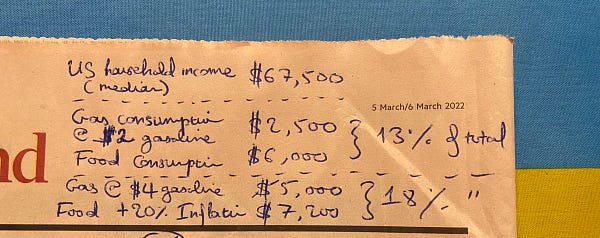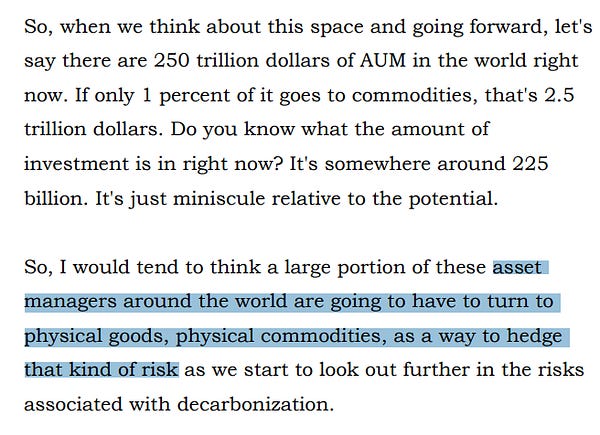The Rational Cloning: Weekly Ideas #25
Rhizome Partners on FRPH, HHC, INDT, CLPR; Palm Capital on Constellation Software, Salesforce; Gator Capital on Enact, Genworth
Welcome to the 25th edition of the Rational Cloning Newsletter (Weekly Ideas Series).
Helping you discover the best ideas of others.
Happy cloning.
Weekly Investment Ideas
(1) Rhizome Partners Q4 2021 Letter
Describing our fund, I recently told another fund manager, “We mostly invest in rock pits, real estate, plastic packaging, chemical distribution, equipment rental, cable companies, and warehouses.”
It dawned on me then why no one wants to talk to me at cocktail parties anymore.
But we are really invested in NIMBYism, LIPOR + E, route density, scale advantages, high freight-to-weight ratios, pricing power, regulatory barriers, physical moats, skilled labor scarcities, oligopolies, and shrinking supplies.
a. FRP Holdings (FRPH)
We estimate that the private market value of FRP Holdings is now roughly $90 per share and will go to $110 by year-end 2023. Aggregates, multifamily, and warehouses are all experiencing strong fundamentals. The stabilization of Bryant Street project in Washington, D.C., and the two Greenville, SC, projects will likely result in an additional $40-60 million of net income being recognized in 2022, by generally accepted accounting practices (GAAP). Both projects are reallocations into opportunity zones and will likely achieve more than 20% IRR on invested capital. Since our 2015 investment in FRP Holdings, we believe the company’s management has generated greater than 15% IRRs on all its development projects. Owning FRP Holdings is a way for us to buy into the private real estate holdings of a benevolent billionaire family (the Bakers) at half price. Yet the family and FRP Holdings’ employees continue to create value for minority shareholders for a management fee of less than 1%. This is an absolute steal compared with real estate private equity investments.
b. Howard Hughes (HHC)
In Q4, Howard Hughes Corporation (HHC) announced the sale of its Chicago office tower for more than $1 billion. The building was 85% leased at the time the sale was announced. HHC contributed the land, valued at $85 million, and an additional $5 million in cash. The expected pre-tax proceed to HHC is estimated at $270 million. This is an outstanding outcome for an urban office development project delivered after Covid ravaged the office sector. The company also gained approval for its $850 million development project on the site of the former parking lot in the Seaport in New York City. This is an important milestone after a long and contentious zoning process. HHC also bought a 37,000-acre shovel-ready master-planned community in Phoenix, AZ, for $600 million. We still believe that the company is an excellent developer and each community continues to strengthen with the development of new amenities. This strength will eventually be manifested in rent growth, ample net operating income (NOI) upon stabilization, and simplification of the story over time. The market does not yet appreciate these unique characteristics of the Howard Hughes missions. We’ll continue to wait patiently for the market to agree with us.
c. INDT
Fundamentals in the warehouse and logistics sector have been red hot. In our opinion, INDUS Realty Trust has finally gotten through its “brisket stall” phase, breaking out of the narrow $60s trading range into $80 at year-end. The company has moved quickly to acquire buildings, develop warehouses, and move into new geographies, such as Nashville, TN, and Charleston, SC. The company also raised $261 million of equity capital during 2021 and built out a new shareholder base. INDUS acquired 1 million square feet of warehouse space in 2021 and has several development projects in the pipeline. Daily trading volume exceeds $2 million today, which is about 10 times the daily volume when we bought our position. We’re excited to see what the CEO and the former team at Gramercy can accomplish at INDUS Realty with a low cost of equity capital. We believe INDUS Realty Trust can compound at 15-20% per year for the next few years. To hedge our broader warehouse risk, we’ll buy puts in Prologis.
d. CLPR
The market is finally starting to agree with us on Clipper Realty. Apartment inventory in New York City is tight. Apartment rents in December 2021 hit a record high. The year 2021 has been good for Sunbelt multifamily apartment REITs. We believe 2022 may be the year that coastal apartment REITs like Clipper, Avalon Bay, and Equity Residential experience strong gains. We’ve noticed other investors are now more receptive to the Clipper thesis when we explain it. They thank us for a good way to play the New York City recovery rather than debate us about the city’s future. Rents and occupancy are both strong and sentiments appear to have inflected. We look forward to Clipper reporting strong growth in NOI and funds from operations (FFO) in 2022 and beyond.
(2) Palm Capital Q4 2021 Letter
At Palm Capital, we look for businesses with durable competitive advantages run by exceptional managers. We patiently wait to invest when their prices are less than we think they are worth, aiming to benefit as they compound economic value over time. We only sell if fundamentals deteriorate, or we find others offering potentially better after-tax returns.
Once again, the sell-off has provided us with an opportunity to add to our ownership of exceptional businesses at attractive prices. We will outline two of our favourite ones that we have been buying over the past few months below.
a. Constellation Software
Constellation Software was founded in 1995 by current CEO, Mark Leonard, who is one of the best capital allocators of all time. Identifying the attractive economics of software companies – stable revenue, low capital intensity, high margins and high and steady cashflows – he set out to create a long-term acquirer of these businesses.
The current share price implies that the company will grow its free cashflow at 7% p.a. over the next 10 years versus a historic free cashflow growth of 30% p.a. since 2006 or 20% p.a. over the past 5 years. We think that this is a very low ask for this incredible management team and that it more than prices in the risk of a quicker slowdown than we expect.
b. Salesforce
Identifying the power of the internet to vastly improve the delivery of software to customers, current CEO, Marc Benioff, founded Salesforce in 1999. The company’s initial product - Customer Relationship Management (CRM) software – wasn’t very different from that of the well-established incumbents. But delivering it over the internet resulted in a much better user experience.
We think that Salesforce is materially undervalued. The company has lots of room for growth from existing markets (Gartner estimates that these markets will grow in the mid-teens for the next 5 years) and new adjacent products. And it is still in its investment phase, with operating expenses at 73% of revenue versus 51% for similar-sized Adobe and 27% for Microsoft. A large part of this is sales and marketing which is close to 40% of revenue at Salesforce versus 27% at Adobe and 13% at Microsoft. With an estimated 400% return on marketing investment, we expect the company to create significant value over time.
(3) Gator Capital Q4 2021 Letter
a. Victory Capital (VCTR), Realogy (RLGY), PennyMac Financial Services (PFSI), Ambac (AMBC)
We have several large holdings with inexpensive valuations and catalysts unrelated to higher interest rates. Here are examples:
Victory Capital (VCTR) is an asset manager making attractive acquisitions of smaller asset managers, trading at 6x earnings, and returning capital to shareholders through increased dividends and share repurchases.
Realogy (RLGY), the parent company of Coldwell Banker, trades at 4x EBITDA, and announced a share repurchase program equal to 15% of the company’s market capitalization.
PennyMac Financial Services (PFSI), a well-run mortgage bank, trades at 4x earnings, less than 1x tangible book value, and has repurchased 24% of its shares in the last 18 months.
Ambac (AMBC) has its lawsuit against Countrywide/Bank of America scheduled for September, 2022 which we expect will result in a large cash infusion to the company
b. Enact Holdings
Thesis
Ignored stock – Enact’s stock is ignored because of its low float. Enact held an initial public offering in September 2021. Genworth retained ownership of 81.6% of Enact’s shares. 9% was sold in a private placement to another money manager, so only 10% of Enact’s shares are free to trade by public investors. This prevents larger investors from taking a significant position in Enact.
Low valuation – Enact trades for 85% of tangible book value and 6x earnings. It is the least expensive stock of the publicly traded mortgage insurers, and we believe the entire group is cheap. The valuations are especially attractive given there are likely very few losses in their existing portfolios, and mortgage insurers have used strong underwriting criteria since the Great Financial Crisis (“GFC").
Strong housing market – The Millennial Generation is in their peak home-buying years. We believe insurance volume will be robust for all mortgage insurers. Strong housing prices mean that the existing portfolios of the mortgage insurers will experience low losses.
Dividends in the near future – We expect Enact to begin paying dividends to shareholders in late 2022. Because Enact generates more capital than it needs for growth, we believe Enact's board will set the dividend payout rate at 40% of earnings. This would translate to a stock yield of about 6%, which we think will be attractive to potential shareholders.
Parent oversight – Genworth owns 81.6% of Enact stock, and we believe there are benefits from Genworth’s oversight of Enact. As the only cash-flowing asset owned by Genworth, we think Genworth will encourage Enact to pay dividends to shareholders. Although we don't expect Enact management to make any poor acquisitions, we believe Genworth serves as an effective blocker of any poor capital management decisions. We acknowledge that Genworth limited their control over Enact by reducing the number of Board seats they control, but we think Enact's board is aware of Genworth's preferences for significant capital return through dividends.
Industry growth – The mortgage insurance industry is growing between 6-10% annually. With rising home prices, borrowers will have an even tougher time accumulating money for a down payment, so they will turn to mortgage insurance. Also, the Millennial generation is at its peak years for buying a first home. First-time home buyers are the largest users of mortgage insurance. We believe the mortgage insurance industry will continue to enjoy strong volume growth in the coming years
c. Genworth Financial
We also own shares of Enact's parent company Genworth Financial. We think Genworth is more attractive than Enact:
Leveraged return on Enact – Genworth’s main asset is the 132 million shares of Enact it still holds. Genworth also has about $1 billion of net debt at its holding company, so it is a leveraged version of Enact. If Enact stock increases in value, Genworth should increase a greater percentage due to the leverage at Genworth’s holding company.
Two other assets held – Genworth has two other assets that we believe are not reflected in Genworth's stock price. Currently, Genworth trades for approximately the value of its stake in Enact less its net debt.
Share repurchases on the horizon – We expect Genworth to begin repurchasing its shares during 2022. Genworth has paid down its holding company debt to its target level of $1 billion. As Genworth receives cash at its holding company from its tax-sharing arrangements with its subsidiaries and dividends from Enact, we believe Genworth will announce its intention to repurchase shares as early as the Q1 earnings announcement in early May. Since we believe Genworth’s shares are trading below intrinsic value due to the attractive valuation of Enact and Genworth’s other two assets, we believe these potential share repurchases will create additional value.
Optionality with Enact stake – While most investors think Genworth will spin-off its stake in Enact, we think it is more likely that Genworth will buy-in the Enact shares. Genworth’s financial position has improved rapidly in the last year. As Genworth uses its cash flow from the taxsharing arrangements and dividends from Enact to repurchase its shares, we think a possible scenario is for Genworth’s shares to outperform Enact’s. Right now, we believe Genworth is cheap relative to Enact, but if this were to flip, where Genworth was relatively more expensive than Enact, we think it will make sense for Genworth to buy-in the Enact shares it sold in September 2021
Tweets That Make You Go… Hmm 🤔








If you enjoyed this issue, please do us the HUGE favor of pressing the Like button :)
Check out previous issues of Weekly Ideas👇
Weekly Ideas #20: Greenhaven, Alta Fox and Maran Capital's 2021 Q4 Letters
Weekly Ideas #19: Baron on Real Estate, Nitor Capital on VST, CF, JOE






